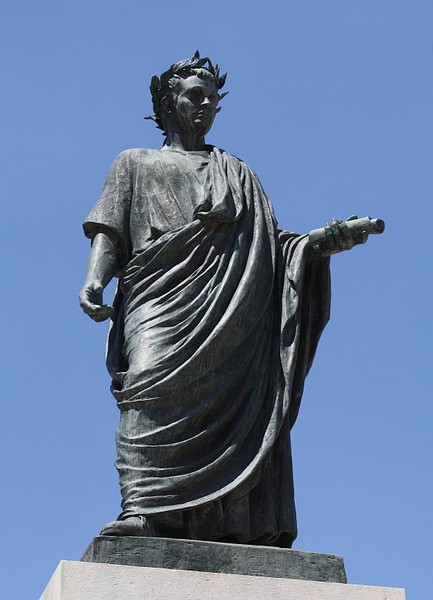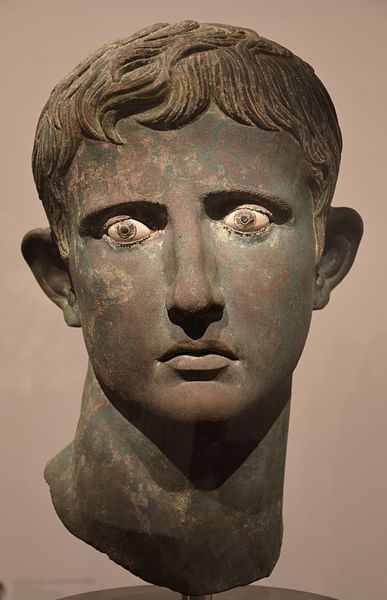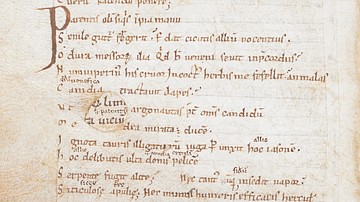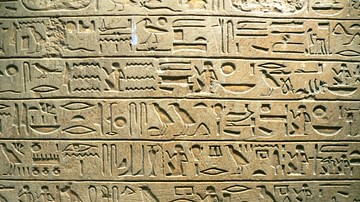Horace's Epistles are a series of letters, providing sage advice to various friends. Quintus Horatius Flaccus, better known as Horace (65-8 BCE) wrote 20 letters around 20-19 BCE, collected in Epistles I, while Epistles II, most likely written at the end of his career, only contains two letters: one to Emperor Augustus and one to Julius Florus.
Horace
Quintus Horatius Flaccus was born in Venusia in the southeastern Italian province of Apulia on 8 December 65 BCE. His father, a freedman, worked as a public auctioneer and was allegedly enslaved when Venusia was captured by the Romans during the Social War of 91-87 BCE. Although the son of a freedman, Horace was able to attend the highly-respected school of Orbilius in Rome and later study in Athens. In 43 BCE, while in Athens, he became acquainted with one of the assassins of Julius Caesar, Marcus Junius Brutus. As a military tribune (tribunus militum), he fought alongside Brutus on the losing side at the Battle of Philippi in 42 BCE.
Upon returning to Rome, he discovered he had lost his father's estate. He described his time in Rome after Philippi in a letter to his close friend Julius Florus:
…as soon as the battle of Philippi dismissed me in an abject condition with my wings clipped and destitute both of house and land, daring poverty urged me on to composition of verses. (Epistles, II-ii)
The young poet had a difficult time adjusting to his new life in Rome. Hamilton wrote that, when he returned from Philippi, he began to write, but these early writings display a "bitterness, even a brutality sometimes, which show how close he had come to the dangers of being permanently warped and stunted" (120-121). This, however, soon passed, and he was able to secure a position of a clerk to a quaestor (scriba quaestorus).
In 38 BCE, through his acquaintance with the poets Virgil (70-21 BCE) and Varius Rufus (74-14 BCE), he was introduced to Gaius Maecenas, a wealthy Roman and patron of the arts who gathered around him a circle of young poets. Later, Maecenas would give the young poet a farm on the Sabine Hills at Tivoli where he would build a villa, which would be his sanctuary away from Rome. At the villa, Horace was able to pursue a leisurely existence away from the pressures of city life.
Dedicating his life to poetry, Horace's friendship with Maecenas and Virgil brought him close to Roman emperor Augustus (r. 27 BCE to 14 CE), who, luckily for both poets (and Ovid), was a patron of the arts. Despite his early allegiance to one of Caesar's assassins, Horace eventually became a close friend to the emperor. He offered Horace a position on the imperial staff, but he refused. However, in 17 BCE, he accepted the emperor's request to write a lyric poem: the Carmen Saeculare, or Secular Hymn, which celebrated the Ludi saeculares, the Secular Games.
Works
Written over a period of 30 years, Horace's works include his Satires, Epodes, Odes, Epistles, and the lengthy Ars Poetica. Horace's poems demonstrate a joy for life and a love of nature. They not only speak of politics but also his admiration for the rural way of life. Horace's poetic style is considered to be rich, terse, and pointed. He wrote the semi-autobiographical Satires in 36-35 BCE, and many of the 17 poems of Horace's Epodes were written before his acquaintance with Maecenas but only published later, in 30-29 BCE. Lastly, the 88 Odes in 13 BCE were poems that celebrated the military and political achievements of Augustus, particularly the Battle of Actium. The letters of Epistles I were written around 20-19 BCE; however, the exact dates of the later Epistles II and Ars Poetica are unknown.
Along with the Ars Poetica, Epistles II represents the final chapter of the poet's career. The Ars Poetica – on the art of poetry – was the longest and the last of his works. According to author and translator Stephen Harrison, all three share a sense of Horace's "self-location" in Roman literature. They are concerned with a central theme: the usefulness of the poet, and Horace in particular, in the community of Rome. He was proud of what he had accomplished and his place in Roman poetry: "I was the original who set my free footsteps upon the vacant sod; I trod not in the steps of others." (Epistles I–xix) In Epistles I–xx, he also spoke of his last days and how he hoped to be remembered: "...you shall tell them that I was the son of a freedman and extended my wings beyond my nest ... I was in favor with the first man in the state, both in war and peace ..."
Epistles I
Like his Satires and Odes, in the Epistles, Horace tried to persuade his friends to live a thoughtful and moderate life, avoiding both stress and excess. This desire for a sensible life, together with his love for the solitude of his villa, is evidence of his time in Athens. For most of his adult life, Horace always held a deep respect and admiration for Greek philosophy, especially Epicurus (341-270 BCE). In the letters of Epistles I, he renounced the frivolities of poetry for the serious concerns of philosophy. In a letter to Julius Florus, Horace spoke of his transition to philosophy and attempted to persuade Florus to join him:
What thyme are you busy hovering about? Your genius is not small ... If now you could quit the cold fomentations of care, whither some heavenly wisdom would lead you, you would go. Let us ... push forward in this work in this pursuit .
(Epistles I-iii)
This desire to share his love of philosophy and persuade others to follow him can be seen in a letter to a young family friend, Lollius: "In everything you must read and consult the learned, by what means you may be included to pass your life in an agreeable manner" (Epistles I-viii). Horace's love of the Greek tradition is also evident in his admiration of the Greek poet, Homer, preferring him as a moral writer. In an earlier letter to Lollius, he writes that he had "perused over again the writer of the Trojan war; who teaches more clearly, and better than Chrysippus [a Stoic] and Crantor [a Platonist], what is honorable, what is shameful, what is profitable, what is not so…" (Epistles I-ii) After retelling the stories of Troy, of Ulysses, of Achilles, Horace advises Lollius to "boldly undertake the study of true wisdom" and, while still young and with an untainted mind, to apply himself to be the master of morality (Epistles I-ii).

In one of the letters to Maecenas, Horace describes some of the significant changes in his life:
My age is not the same, nor is my genius. ... I lay aside both verses and all sportive matters; my study and inquiry is after what is true and fitting, and I am wholly engaged in this: I lay up, and collect rules which I may be able hereafter to bring into use.
(Epistles I-i)
Above all things Horace loved his villa on the Sabine Hills, preferring life in the country versus that of the city. In a letter to Aristius Fuscus, he praises one's life in the country: "If we must live suitably to nature and a plot of ground is to be sought to raise a house upon, do you know any place preferable to the blissful country?" (Epistles I-x) In a letter to his steward, he speaks of his reluctance to go to the city:
When you were a drudge at everyone's beck, you tacitly prayed for the country, and now, being appointed my steward, you wish for the city, the shows, and the baths. You know I am consistent with myself, and loathe to go whenever disagreeable business drags me into Rome.
(Epistles, I -xiv)
His letters and verses advocate being content with a person's lot in life and not worrying about what the future may bring. But in contrast to this, he remained keenly aware of the inevitability of death. In a relatively short letter to Albert Tibrellus – a critic of Horace's works – the poet warns him that the gods have given him wealth and the ability to enjoy it but then reminds him of the possibility of death at any time: "In the midst of hope and care, in the midst of fears and disquietude think every day that shines upon you is the last." Horace ended the letter with a rather snide comment, "When you have a mind to laugh, you shall see me fat and sleek with good keeping a hog of Epicurus' herd," a subtle reference to the Greek philosopher who advocated a life of pleasure (Epistles I-iv).
To Quinctus, Horace again wrote on the subject of death: "For he who will be covetous will also be anxious: but he that lives in a state of anxiety will never in my estimation be free." (Epistles I-xvi). He added that an individual who is immersed in increasing his fortune has deserted the path of virtue. In the end, he tells Quinctus that "Death is the ultimate boundary of human matters" (Epistles I-xvi)
Epistles II
Horace wrote during a transitional period in Roman history when the Roman Republic was being replaced by an empire and an emperor. In a lengthy letter (Epistles II-i), he wrote to the emperor about the origins and character of poetry in both Greece and Rome. In the opening paragraph, he complimented Augustus on his role as emperor: "... in you alone support so many and such weighty concerns, defend Italy with your arms, adorn it by your virtue, reform it by your laws."
As time passed and his desire to write waned, he wrote to Florus: "The advancing years rob us of everything: they have taken away my mirth, my gallantry, my revelings and play; they are now proceeding to force poetry from me." (Epistles II-ii) Although he had renounced his own writing of verses, he had not lost his love of poetry; however, despite his own success and the respect of other poets, he appeared insecure and questioned his own position, unsure of his place in posterity. He wrote: "I had rather be esteemed a foolish and dull writer, while my faults please myself, or at least escape my notice than be wise and smart for it." (Epistles II -ii).










